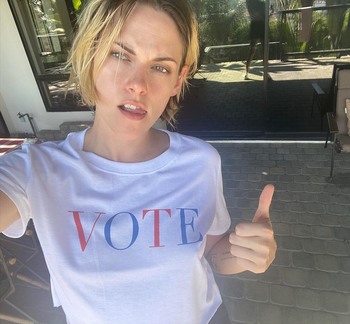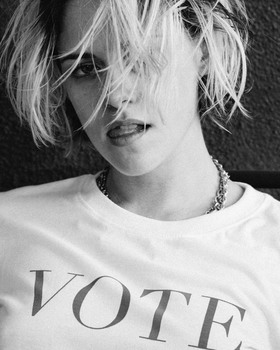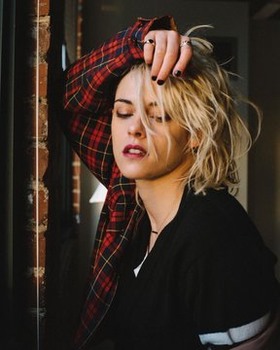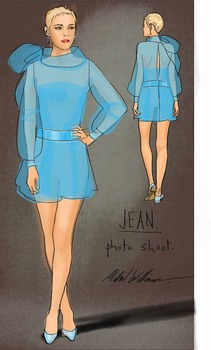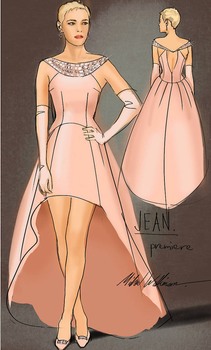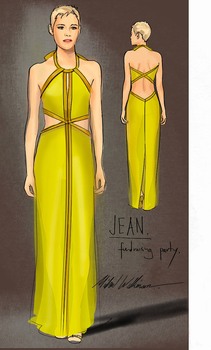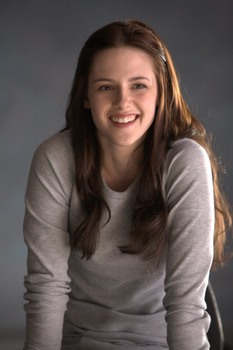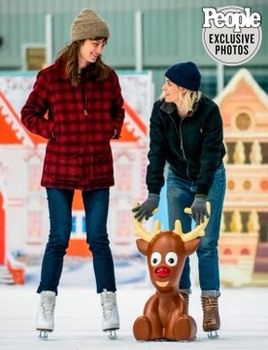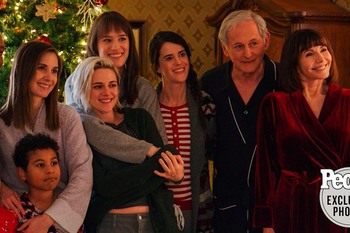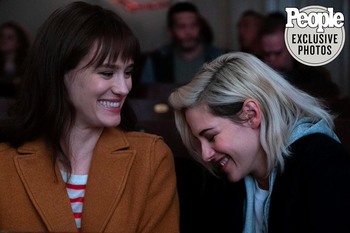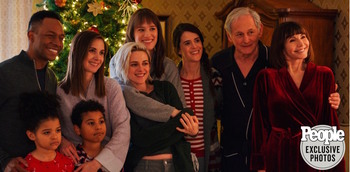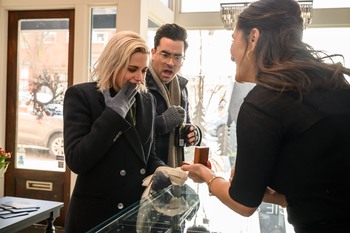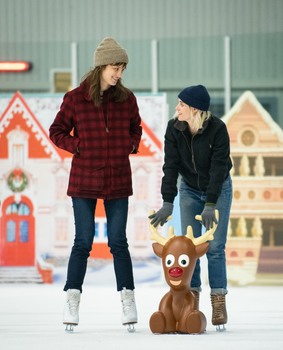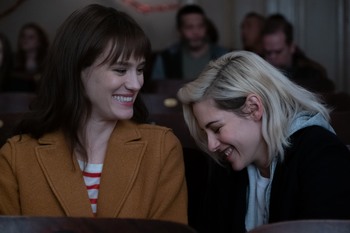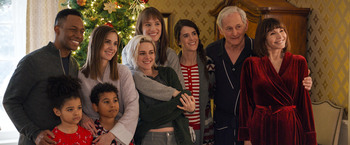Google translated.
What interested or inspired you in the story of Jean Seberg?
I became interested in this period in her life when her success as an actress, her political engagement and her love life intersected. Jean was a very idealistic person who tried to voice a good cause, which ultimately got her into the crosshairs of a big FBI wiretap. This action ultimately broke her up, her private life was severely disrupted, everything was approved by the state. In a way, that was a fascinating discovery for me and a very complex subject.
Many celebrities these days use their popularity to express their political opinions or support movements. Would someone like Jean Seberg be treated differently today than they were in the 60s?
To be honest, I don't know because my film is about a very specific example within a very specific context. Of course, today social media and the internet allow many celebrities to express their opinion on political issues, but in Seberg's case we also have a very special socio-political framework. Because African American political movements within the mainstream media as well as a racist FBI were perceived as a threat, it became a target. That had less to do with the nature of her political engagement, which, in contrast to that of Jane Fonda, for example, was by no means so public. Jean's engagement was mostly of a private nature and was reflected in her donations for the Malcom X Foundation or the Black Panthers.
What I find so terrifying about their story is how surveillance is directed against a person and changes them, brings them to the brink, and all for purely political reasons. Added to this is how this institution used the private life of the intercepted person as a weapon against them, discredited them and spread “fake news” about them. In our world we live with the reality of a war of information, whether it is true or false. Jean Seberg is, if you will, one of the first victims of this war.
Regarding Una and Ray, you once said that you are interested in characters whose experiences make them strangers to themselves. How could this apply to the characters in Against All Enemies ?
If you look at a character like Jean Seberg in my film, you could say that his experience is similar to that of Jack O'Connell's character. Both have to go through fire and in Jean's case it results in the destruction of what she sees as truth and reality. This is the consequence of surveillance and the lies that are being spread about them. She is caught in a spiral that is associated with high personal losses.
This experience gives her a changed perception of the world, which one can sense in the last moments of the film. Then she is no longer that somewhat naive, very impulsive woman that we met at the beginning of the film. Characters like Blanche DuBois from Tennessee Williams' Endstation Sehnsucht or King Lear, but also characters like Una and Ray have to go through this painful experience in order to then arrive at a different understanding of their world. This process is very complex and not exactly easy to define.
In parallel with Jean's story, Jack O'Donnell's character goes through a similar development. He changes from a man who believes in democratic values and the moral integrity of the FBI to someone who, by seeing what happens to Jean, sees how corrupt this system is. Because his truth, his world, has also changed, he ultimately becomes a whistleblower, a person who has completely emancipated himself from his character at the beginning of the film.
The scene in which Kristen Stewart and Anthony Mackie's characters rehearse a dialogue from a script is very beautiful, well played and staged. Can you tell us something about the creation of this scene or others that you are particularly proud of?
In this scene we wanted to show Jean's life as an actress on the one hand, but also to shed light on her affair with Hakim. Hakim gets a glimpse of their world, but within this game of conversation they are rehearsing, he also gets an idea of who she is and can be. I like the way Anthony Mackie plays in that scene and the location, which was incredibly beautiful. The scene they both play, i.e. the one in the fictional screenplay in the film, comes very close to a scene in Seberg's film Westwärts the wind draws very close, but we changed and adjusted the dialogue for the film a bit.
In general, there is a lot that I'm proud of in this film. This includes the subtlety of Jack O'Connell's play and the very courageous portrayal of Jean Seberg by Kristen Stewart. A very exciting and dramatic scene that I really like is the children's birthday party. On the one hand it is a happy, almost idyllic occasion with the many children, the beautiful weather and the barbecue, but then you know that Zazie Beetz, who plays Hakim's wife in the film, knows about the affair and is now confronting Jean with it . She insults her as a tourist who is only superficially interested in black people's concerns for reasons of prestige. In addition to the performance in the scene, I like how the complexity of the relationships between the characters is shown here.
Another example of a scene that I like is the picture of Jean in the swimming pool, when the process of her mental decline from reporting and surveillance is well underway. On a visual level, I find this sequence beautiful and very complex.
I also find the scene with Jack O'Donnell and Vince Vaughn's characters interesting, when they both have dinner with their families and Vaughn's character suddenly has a very loud argument with his daughter.
This scene roughly shows the Republican-Conservative nightmare (laughs). Vince's character is someone who is fighting something like war with his son and daughter when he talks about his son joining a commune. At the same time, this war is also the one he is fighting in his work: to make the USA a white, conservative, very masculine dominated country. This is a character who tries to maintain control, but who keeps losing control.
In addition, the scene is interesting because here the FBI is no longer perceived as just a machine or an institution, but as a viewer you get an insight into the private life of the investigators.
It was important to me that every scene refers to the relationship between Jean and Jack. So when Vince's character annoys at the end of the scene and asks who she looks like while looking at his daughter and her short hairstyle, the film comes back to this relationship between Jack and Jean.
Can you tell us a bit about your collaboration with cinematographer Rachel Morrison?
One of the most important decisions we made about the look of the film was that we wanted to use real film cameras, not digital ones. Even if we had to make do with a limited budget, we wanted to make a film that was formally similar to the films of the 60s, but also to those conspiracy thrillers of the early 70s, especially the works of Alan J. Pakula ( Klute , Witness a Conspiracy , The Untouchables ) . In general, we had to find a visual language for surveillance, but also for Jeans collapse.
In addition, we sat down with our production designer Jahmin Assa very early on to find suitable locations that should be provocative and expressive. Since we didn't have the money to show a detailed picture of the time, we instead focused on the inner drama of the characters and how the locations and the camera could express it.
Rachel helped a lot with this, because she can shoot extremely beautiful and powerful hand-held camera shots, which you can see in this film but also in her earlier work such as Ryan Coogler's Next Stop: Fruitvale Station . Especially in the later course of the film, the change from initially still static recordings to these restless but very sensitive handheld camera recordings illustrates the process and decay that Jean is going through. The viewer is, I think, able to better understand what Jean is going through.
Thank you for the nice conversation.
Source

